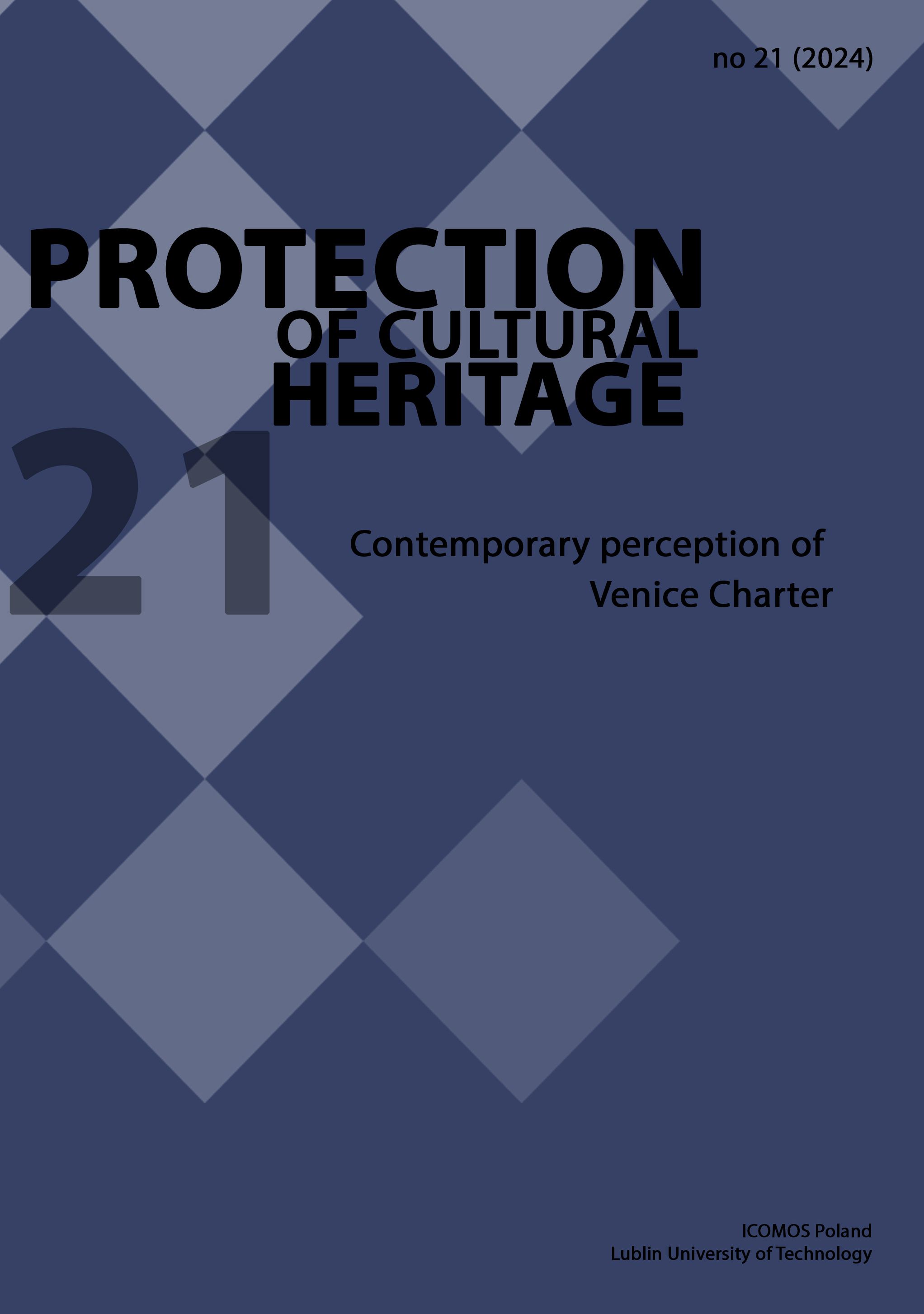Venice Charter and the Development of Authenticity
Article Sidebar
Issue No. 21 (2024)
-
The relevance of the Venice Charter today
Stefano Gizzi1-10
-
Venice Charter and its role in shaping concepts in the heritage protection system
Siwek Andrzej11-22
-
Charter of Historic Cultural Landscapes (CHCL) – proposal
Irena Niedźwiecka-Filipiak, Dorota Sikora, Łukasz Woźniak, Alicja Woźniak23-50
-
Andrzej Tomaszewski's "Pluralistic conservation philosophy" as a challenge: Do we have a problem with European identity?
Janusz Krawczyk51-61
-
Beyond Monuments: Rethinking Heritage Through the Mundane and the Ephemeral in Tokyo
Tamas Solymosi63-76
-
Venice Charter and the Development of Authenticity
Shirley Cefai77-101
-
On the necessity of symbolic interventions in dissonant monuments
Philipp Oswalt103-112
Main Article Content
DOI
Authors
Abstract
Authenticity has been a concern for many centuries. In the 19th century, during the restoration interventions on Notre Dame, it was obvious that authenticity was linked solely to the original material of the monument. It was in the Venice Charter of 1964, that there was an attempt to define authenticity. Since then, the perception and understanding of what is authentic has changed. This shift in meaning is partly due to changes in the sanctioned definitions of chartered documents, which influenced the values society attributed to their heritage. Values counteracted this by becoming wider in scope. Though the Venice Charter mentioned authenticity, it did not specify the attributes heritage should maintain to be considered authentic. This was to change when intangible and tangible heritage were considered as criteria for inscription in World Heritage Sites, particularly with the pivotal contribution from the Japanese experience of intangible heritage when they joined the World Heritage Convention. Once intangible and tangible heritage were considered for inscription in World Heritage Sites, authenticity was pushed to consider other attributes than materiality alone. The understanding of authenticity was developed through discussions regarding World Heritage Sites like Abu Simbel, the Historic Centre of Warsaw and Mostar Bridge, which were enlisted as World Heritage Sites after major interventions or reconstruction works were carried out on them. The article concludes with a discussion regarding how the characteristics of the material used, in particular in a case of reconstruction, could influence the authentic or truthful experience of a historic site.
Keywords:
References
Carbonara, Giovanni& Pergoli Campanelli, Alessandro. “Dell Restauro del Tempio-Duomo di Pozzuoli” Restauro 35-36. 2010. https://documen.site/download/tempio-cattedrale-a-pozzuoli-10-alessandro-pergoli-campanelli_pdf.
Denslagen, W. (1994) Architectural Restoration in Western Europe: controversy and continuity Amsterdam: Architectura & Nature Press.
Denslagen, W. (2009). Romantic Modernism nostalgia in the world of Conservation. Amsterdam: Amsterdam University Press. DOI: https://doi.org/10.5117/9789089641038
Dezzi Bardeschi, Marco. N/A Tempio Duomo Rione Terra. http://www.marcodezzibardeschi.com/_Progetti/incorso/Tempio_Duomo.html
Earl, J. (2003). Building Conservation Philosophy. Shaftesbury: Donhead.
ICOMOS (1964). International Charter for the Conservation and Restoration of Monuments and Sites. (The Venice Charter 1964) https://www.icomos.org/en/participer/179-articles-en-francais/ressources/charters-and-standards/157-thevenice-charter.
ICOMOS (1994) The Nara Document on Authenticity. https://www.icomos.org/en/charters-and-texts/179-articles-en-francais/ressources/charters-and-standards/386-the-nara-document-on-authenticity-1994.
ICOMOS, (1931) The Athens Charter for the Restoration of Historic Monuments – 1931. https://www.icomos.org/en/167-the-athens-charter-for-the-restoration-of-historic-monuments.
ICOMOS, (n/d) Berg, L. The Salvage of the Abu Simbel Temples. https://www.icomos.org/public/monumentum/vol17/vol17_2.pdf.
Jokilehto, J. (1999). A History of Architectural Conservation. Oxford, England: Butterworth-Heinemann. DOI: https://doi.org/10.1080/13556207.1999.10785249
Kiniry L. (2018) Egypt’s exquisite temples that had to be moved. https://www.bbc.com/travel/article/20180409-egypts-exquisite-temples-that-had-to-be-moved.
Madrid Conference (1904) Sixth International Congress of Architects, https://docslib.org/doc/4463614/recommendations-of-the-madrid-conference-1904-sixth-international-congress-of-architects.
Mehr, S. (2019) Analysis of 19th and 20th Century Conservation Key Theories in Relation to Contemporary Adaptive Reuse of Heritage Buildings. Heritage. DOI:10.3390/heritage2010061. DOI: https://doi.org/10.3390/heritage2010061
Munoz Vinas, S. (2023) A theory of Cultural Heritage. Beyond the intangible. Oxforshire, UK, Routledge. DOI: https://doi.org/10.4324/9781003288121
Ruskin, J. 1989, The Seven Lamps of Architeture. Dover Publications.
Stovel, H (2008) Origins and influence of the Nara document on Authenticity. APT Bulletin 39 (2/3): 9-17. https://www.iccrom.org/sites/default/files/publications/2020-05/convern8_01_hstovel_ing.pdf.
UNESCO. (n/d). Historic Centre of Warsaw. https://whc.unesco.org/en/list/30/.
UNESCO. (1980). Operational Guidelines for the implementation of the World Heritage Convention. https://whc.unesco.org/archive/opguide80.pdf.
UNESCO. (2005). Operational Guidelines for the implementation of the World Heritage Convention. https://whc.unesco.org/archive/opguide05-en.pdf.
UNESCO. (n/d). Old Bridge Area of the Old City of Mostar. https://whc.unesco.org/en/list/946/.
UNESCO. Nubian Monuments form Abu Simbel to Philae, https://whc.unesco.org/en/list/88/.
UNESCO. World Heritage Convention. https://whc.unesco.org/en/convention/.
UNESCO. Intangible Cultural Heritage. https://www.ichgovernance.com.
Article Details
Abstract views: 441







